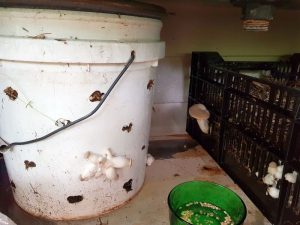Thanks to all the people who have contributed to this week’s newsletter: Lucinda Flynn, Richard Kottek, Tracey Bjorksten, Vasundhara Kandpal and Wayne Tonissen.
We would love to hear from more of you and include some of your words about any food-related matters in future newsletters. Email us with your contribution(s).
Lucinda on unusual ways of growing mushrooms
 As many of you will know, growing mushrooms using kits is very easy so long as you remember to spray a little water on them every day. If it is button mushrooms that you want to grow, a good local supplier of kits is The Mushroom Shed, from Montmorency. If it is more exotic mushrooms, then a supplier that many of us use is Aussie Mushroom Supplies.
As many of you will know, growing mushrooms using kits is very easy so long as you remember to spray a little water on them every day. If it is button mushrooms that you want to grow, a good local supplier of kits is The Mushroom Shed, from Montmorency. If it is more exotic mushrooms, then a supplier that many of us use is Aussie Mushroom Supplies.
But that would all be too simple for Lucinda Flynn! Rather, she is interested in growing her mushrooms in unusual ways and has written an article for our website on her experiments.
Experiment number 1 – use spent mushroom compost: obtain spent mushroom compost from a mushroom grower, find a growing space that is sheltered and can contain a degree of moisture, then water daily with a fine spray.
Experiment number 2 – create your own mushroom buckets/bags: pasteurise straw with water mixed with hydrated lime, then mix with mushroom spawn, then pack tightly (removing air pockets) into buckets with holes drilled and/or bags with holes made.
Experiment number 3 – grow shiitake mushrooms in logs: obtain some freshly cut hardwood logs, drill holes, insert inoculated dowelling into each hole (buy from a mushroom shop), seal the hole with melted beeswax, place the log in a bucket of water and then wait.
For a more extended discussion of each of these experiments, read Lucinda’s full article.
Incidentally, Lucinda’s article refers to ‘tip shops’, which is a term that I, for one, was unfamiliar with. It appears that a tip shop is a shop which sells recycled goods that had been left at Council tips. According to this website, they are frequented by people who:
- Love junk; or
- Have no money to spend on ‘good’ stuff; or
- Love old stuff; or
- Don’t like spending tons of money on ‘good’ stuff; or
- Prefer to make over stuff they find someone didn’t appreciate, to make something wonderful.
Now, one of the great mysteries of my childhood was that my dad spent a substantial proportion of his free time crawling around the local Council tip looking for stuff which then disappeared into our garage never to be seen again. I now understand that he probably thought that he was doing point 5. above.
Read some of Lucinda’s other articles on our website.
Listen up you local food producers!
In the 9th June newsletter, we discussed how the Weeping Grevillea Nursery had some blood limes available for sale. Owner Wayne Tonissen has now written in: “I just wanted to give you a report back on how successful the promotion of our blood limes was in your newsletter. We have had a number of direct contacts and sales as well as referrals. And it hasn’t stopped either. So, a big thank you to you and the service that the newsletter provides, both to us but also to the buyers who are able to discover where to locate unusual products.”
So, to all the other local food producers out there: if you have any news about any of your products, email us with the details.

 In passing, you might be wondering about Wayne’s main business, which is selling weeping grevilleas. A weeping grevillea is a species of grevillea, usually a groundcover or prostrate shrub, which has been grafted onto robust grevillea (Grevillea robusta) rootstock. They come at a variety of heights, from 1 to 2 metres. As they grow, they then grow downwards (not upwards!) until (ideally) they reach down to, or near to, the ground. They particularly suit small gardens because of their controlled size and habit. It is the variety that is grafted then gives the weeping grevillea its features (flower type, colour and growing habit) and Wayne currently stocks around 40 different varieties with varying flower colours and varying flowering periods. Wayne says that they are tough and hardy plants, both drought tolerant and frost hardy. The Weeping Grevillea Nursery is open Saturdays, most Sundays and by appointment. Phone 9719 7505 or Vikki on 0417 143 874.
In passing, you might be wondering about Wayne’s main business, which is selling weeping grevilleas. A weeping grevillea is a species of grevillea, usually a groundcover or prostrate shrub, which has been grafted onto robust grevillea (Grevillea robusta) rootstock. They come at a variety of heights, from 1 to 2 metres. As they grow, they then grow downwards (not upwards!) until (ideally) they reach down to, or near to, the ground. They particularly suit small gardens because of their controlled size and habit. It is the variety that is grafted then gives the weeping grevillea its features (flower type, colour and growing habit) and Wayne currently stocks around 40 different varieties with varying flower colours and varying flowering periods. Wayne says that they are tough and hardy plants, both drought tolerant and frost hardy. The Weeping Grevillea Nursery is open Saturdays, most Sundays and by appointment. Phone 9719 7505 or Vikki on 0417 143 874.
There are many other plants that you can grow weeping versions of. For example, I have weeping Japanese maples, junipers and she-oaks, as well as grevilleas.
More on re-sprouting vegetables
Last week, Pam Jenkins discussed how some of her vegetables had re-sprouted after she cut them down to ground level. Tracey Bjorksten has written in to say that this phenomenon is known as ratooning. Apparently, this technique is sometimes deliberately used in sugarcane and banana cultivation. Whilst not all plants will re-grow that way, Brassica oleracea (broccoli, cabbage, etc) is one that does so easily and Tracey has an old gardening book that advises cutting cabbages back to a stump once harvested and scoring the top of the stump to get 4 new (smaller) cabbages. In her garden, she has also had broad beans, eggplant and tomato ratoon.
Every newsletter needs a good graphic
 Local artist Mirranda Burton has created graphics for each of the 12 principles of permaculture.
Local artist Mirranda Burton has created graphics for each of the 12 principles of permaculture.
Is permaculture political?
A few years ago, I chaired a session where David Holmgren gave the main presentation. As someone who was involved in politics during my working life and in gardening during my retirement, I thought it was interesting how much more political were his answers to questions than was the material in the book that he was promoting (Retrosuburbia). I was recently reminded of this whilst reading this statement, which is entitled Whitewashed hope: a message from 10+ Indigenous leaders and organisations and whose general flavour can be discerned from the following introductory sentence: “While [regenerative agriculture and permaculture] both borrow practices from Indigenous cultures, critically, they leave out our worldviews and continue the pattern of erasing our history and contributions to the modern world.” The article was recently posted to the Permaculture Australia Facebook group, where it promoted fierce debate.
That reminds me that, when I first joined Local Food Connect, its President at the time told me that their byline was ‘changing the world one lentil at a time‘.
Using spent coffee grounds in your garden
 Newsletter reader Sarah Hardgrove’s Master’s research apparently focused on the effects of spent coffee grounds on garden plants. It is in that context that she was recently interviewed by the ABC. Read the interview.
Newsletter reader Sarah Hardgrove’s Master’s research apparently focused on the effects of spent coffee grounds on garden plants. It is in that context that she was recently interviewed by the ABC. Read the interview.
Did you know – many magazines are free
If you are a member of a library, then you can read lots of magazines online for free. I was reminded of this when writing about Jian Liu’s article in ABC Organic Gardener in the 2nd June newsletter. Sure enough, I was able to read the full article (plus everything else in the magazine) online at the library website. To prove it, here are four of Jian’s favourite vegetables that she talks about in the article: celtuce (a form of lettuce where you eat the stems); fig-leaf gourd or Cucurbita ficifolia (she says that it tastes a bit like zucchini); giant red mustard (a variety of mustard greens); and kohlrabi.
At my library at least (Yarra Plenty), you can also read any edition of The Age from the last 15 years, including today’s edition.
Habitat planting on the Diamond Creek
Friends of Edendale and others have organised a session to re-vegetate the Diamond Creek near Edendale to help re-build habitat for the local platypus. The goal is to plant 500 indigenous plants on the day. The session is on Sunday, 18th Jult, 10am-midday. For Covid-related reasons, you need to book your place.
Vasundhara’s scalloped sweet potatoes
Ingredients
2 heads of garlic
2 tablespoons olive oil + additional for roasting the garlic
1 cup onion, finely chopped
1 cup + 1 tablespoon full-fat coconut milk. divided not light
1 cup + 1 tablespoon unsweetened plain almond milk, divided
1½ tablespoons potato starch
1 teaspoon sea salt
¼ teaspoon black pepper
1kg sweet potatoes, thinly sliced (roughly 2 very large potatoes)
Parsley for garnish (optional)
Method
Pre-heat your oven to 200degC and place two squares of tinfoil on top of each other.
Cut the tops of each head of garlic off, so that the tips of each clove is exposed. Peel off any of the large pieces of papery skin. Drizzle the heads with a little bit of olive oil and rub it in. Wrap the tinfoil up like a packet and place into the oven. Cook until the garlic is tender, about 45 minutes.
Once the garlic has roasted, squeeze the garlic out of its skin and finely chop it. Additionally, reduce the oven temperature to 180degC.
Heat the remaining 2 tablespoons of olive oil up in a large, oven-safe frying pan, set over medium/high heat. Cook the onion until golden brown and soft, about 5 minutes.
Add 1 cup of coconut milk and 1 cup of almond milk and bring to a boil. While you wait for the liquid to boil, whisk together the remaining 1 tablespoon of coconut milk, 1 tablespoon of almond milk and 1½ tablespoons of potato starch in a small bowl, until smooth.
Once the milk mixture boils, whisk in the potato starch mixture, stirring constantly so it doesn’t gum up in the milk, and boil for 2 minutes, again stirring constantly.
Reduce the heat to medium, add in the salt, pepper and chopped roasted garlic, and cook the sauce for an additional 5-6 minutes until nice and thick, stirring frequently.
Once the sauce has cooked, add in the thinly sliced potatoes and stir around until they are coated in the sauce. Then, move the potatoes around with you spoon until they are in flat layers.
Cover the pan with tinfoil and place into the oven for 30 minutes. Uncover the pan, press the potatoes down so that they really sink into the sauce, and cook and additional 30-40 minutes, until the potatoes are fork tender and the top if browned.
Read more of Vasundhara’s recipes on our website.
Which link was clicked most times in the last newsletter?
The most popular link last week was Ann’s article about Silvertine Farm.
Joke (or pun) of the week
What did the apple say to the almond? You’re nuts!
Upcoming events – introduction
Website calendars
By type of event: All once-off events, Cooking, Everything else, Garden tours, Free.
By Council area: Banyule, Boroondara, City of Yarra, Darebin, Manningham, Maroondah, Moreland, Nillumbik, Whitehorse, Whittlesea and Yarra Ranges.
In the list below, events costing $10 or less are in bold.
For Covid-related reasons, some of the events below may have been cancelled or deferred.
Upcoming events – not cooking
Newly announced
- Winter fruit tree pruning workshop: Saturday, 10th July, 9am-1pm; free; Edendale.
- Tree pruning workshop: Saturday, 10th July, 1-3pm; $15; Macleod.
- Insect hotel workshop: Thursday, 22nd July, 10am-midday; free; Doncaster.
- Bus trip to the Edible Forest: Thursday, 5th August, 9.30am-2.30pm; $10; Whittlesea then Dixons Creek.
- Kitchen gardens for schools and the community: Saturday, 14th August, 10am-3pm; $110 ($22 per hour); CERES.
- Pick and eat – winter harvest: Saturday, 14th August, 10.30am-12.30pm; $41 ($20 per hour); Bulleen.
- Beekeeping workshop: Saturday, 14th August, 2-4.30pm; $85 ($34 per hour); Brunswick East.
June
- Whiskeys of the world: Thursday, 24th June, 6-8pm; $74 ($37 per hour); Fitzroy.
- Mould – a cheese festival: Friday, 25th June, 4.30-8.30pm and Saturday, 26th June, 11am-8pm; $49 (includes all cheese tastings); Abbotsford.
- Native plants for food and medicine: Saturday, 26th June, 9.30am-12.30pm; $55 ($18 per hour); Bulleen Art and Garden.
- Wild fermentation class and edible forest tour: Saturday, 26th June, 10am-1pm; $85 ($28 per hour); Dixons Creek.
- Growing berries: Saturday, 26th June, 10am-3pm; $110 ($22 per hour); CERES.
- Bakery Hill whisky distillery tour and tasting: Sunday, 27th June, 2-3.30pm; $59 ($40 per hour); Bayswater North.
July
- Healthy productive compost and worms: Saturday, 3rd July, 9.30am-midday; $50 ($20 per hour); Bulleen Art and Garden.
- Food photography: Saturday, 3rd July, 9.30am-12.30pm; $106 ($35 per hour); Eltham.
- Bakery Hill whisky distillery tour and tasting: Sunday, 4th July, 2-3.30pm; $59 ($40 per hour); Bayswater North.
- Kids in the garden: Wednesday, 7th July, 1-3pm; free; Macleod.
- Beeswax wraps: Saturday, 10th July, 10am-midday; $75 ($38 per hour); CERES.
- Bakery Hill whisky distillery tour and tasting: Sunday, 11th July, 2-3.30pm; $59 ($40 per hour); Bayswater North.
- Farmers market workshop series – the A-Z overview of food labelling: Tuesday, 13th July, 10-11.30am; $40 ($27 per hour); Alphington.
- Getting the best from your soil: Tuesday, 13th July, 1-2pm; free; Coburg.
- Permaculture Design Course (100 hours): starting Wednesday, 14th July, 6.30-9.30pm; $1,980; CERES.
- Complete urban farmer (14 sessions): starting Thursday, 14th July, 9am-3pm; $880 for ACFE eligible participants ($10 per hour); CERES.
- Wild fermentation class and edible forest tour: Saturday, 17th July, 10am-1pm; $85 ($28 per hour); Dixons Creek.
- Organic propagation of vegetables and herbs: Saturday, 17th July, 10am-3pm; $110 ($22 per hour); CERES.
- Winter fruit tree maintenance: Sunday, 18th July, 9.30am-12.30pm; $55 ($18 per hour); Bulleen Art and Garden.
- Bakery Hill whisky distillery tour and tasting: Sunday, 18th July, 2-3.30pm; $59 ($40 per hour); Bayswater North.
- Wine workshop for enthusiasts: Tuesday, 20th July, 7-8.30pm; $30 ($20 per hour); Hawthorn.
- How to make beeswax food wraps: Wednesday, 21st July, 6.30-8pm; $60 ($40 per hour); Fitzroy.
- DIY Mushrooms: Saturday, 24th July, 10am-4pm; $165 ($28 per hour); CERES.
- Pruning and care of fruit trees: Saturday, 24th July, 10am-3pm; $110 ($22 per hour); CERES.
- Home composting for beginners: Saturday, 24th July, 2-3.30pm; free; Edendale.
- Bakery Hill whisky distillery tour and tasting: Sunday, 25th July, 2-3.30pm; $59 ($40 per hour); Bayswater North.
- Farmers market workshop series – pricing for profit: Tuesday, 27th July, 10-11.30am; $40 ($27 per hour); Alphington.
- Wild fermentation class and edible forest tour: Saturday, 31st July, 10am-1pm; $85 ($28 per hour); Dixons Creek.
- Set up a worm farm: Saturday, 31st July, 2-3pm; free; Edendale.
August
- Build a bee hotel: Sunday, 1st August, 2.30-4.30pm; $100 ($50 per hour); Fitzroy.
- Farmers market workshop series – planning for growth: Tuesday, 10th August, 10-11.30am; $40 ($27 per hour); Alphington.
Upcoming events – cooking
Newly announced
- Sourdough breadmaking workshop: Wednesday, 14th July, 10am-1pm; $90 ($30 per hour); Surrey Hills.
- Vegan pasta making class: Sunday, 1st August, midday-2pm; $69 ($35 per hour); Fitzroy.
- Sourdough basics: Thursday, 5th August, 6.30-9.30pm; $95 ($32 per hour); Fitzroy.
- Sri Lankan cooking class: Friday, 6th August, 6-9pm; $90 ($30 per hour); Surrey Hills.
- Italian kids cooking class: Thursday, 12th August, 4.30-6.30pm; $35 ($18 per hour); Surrey Hills.
- Vegan cooking Italian style: Saturday, 14th August, 10am-3pm; $110 ($22 per hour); CERES.
- Triple cream brie cheese: Sunday, 15th August, 10am-4pm; $170 ($28 per hour); CERES.
- Truffle workshop at Ratio Cocoa Roasters: Sunday, 15th August, 11am-12.30pm; $75 ($50 per hour); Brunswick.
- Mozzarella making class: Sunday, 15th August, 2-4pm; $110 ($55 per hour); Thomastown.
- Sicilian cannoli: Sunday, 15th August, 2-4pm; $84 ($42 per hour); Fitzroy.
- The ultimate biscuit class: Tuesday, 17th August, 10am-3pm; $160 ($32 per hour); Blackburn.
June
- Mediterranean cooking workshop (vegan): Wednesday, 23rd June, 6.30-8.30pm; $60 ($30 per hour); Balwyn North.
- Nonna & Mum’s cooking class: Thursday, 24th June, 7.30-10pm; $20 ($8 per hour); Thornbury.
- Truffle and praline workshop: Friday, 25th June, 6-10pm; $180 ($45 per hour); Blackburn.
- Rosa’s Friday traditional Italian cooking class: Friday, 25th June, 6-10pm; $155 ($39 per hour); Bundoora.
- Sourdough bread baking: Saturday, 26th June, 9am-5pm; $180 ($23 per hour); CERES.
- Sourdough bread workshop: Saturday, 26th June, 9am-11.30pm; $165 ($66 per hour); Brunswick East.
- Rosa’s Saturday traditional Italian cooking class: Saturday, 26th June, 10.30am-2.30pm; $155 ($39 per hour); Bundoora.
- Artisan bread making: Sunday, 27th June, 8am-2pm; $190 ($32 per hour); Abbotsford.
- Veggies in desserts: Sunday, 27th June, 10am-3pm; $110 ($22 per hour); CERES.
- Rosa’s Sunday traditional Italian cooking class: Sunday, 27th June, 10.30am-2.30pm; $155 ($39 per hour); Bundoora.
- Master class in Vietnamese finger food: Sunday, 27th June, 10.30am-3pm; $160 ($36 per hour); Panton Hill.
- The ultimate biscuit class: Tuesday, 29th June, 10am-3pm; $160 ($32 per hour); Blackburn.
- The mighty booch – DIY kombucha: Tuesday, 29th June, 6.30-8.30pm; $80 ($40 per hour); Fitzroy.
- Sourdough basics: Wednesday, 30th June, 6.30-9.30pm; $95 ($32 per hour); Fitzroy.
July
- Become a junior chocolatier: Thursday, 1st July, 4 occurrences starting at 9am, 10am, 11am and midday; $40 ($53 per hour); Yarra Glen.
- Rosa’s Friday traditional Italian cooking class: Friday, 2nd July, 6-10pm; $155 ($39 per hour); Bundoora.
- Intro to fermenting at home: Saturday, 3rd July, 10am-midday; $70 ($35 per hour); CERES.
- Tortelloni and ravioli class: Saturday, 3rd July, 10am-1pm; $110 ($37 per hour); Thomastown.
- Rosa’s Saturday traditional Italian cooking class: Saturday, 3rd July, 10.30am-2.30pm; $155 ($39 per hour); Bundoora.
- Choux pastry workshop: Saturday, 3rd July, 11am-12.30pm; $55 ($37 per hour); Yarra Glen.
- Beginners bread making: Sunday, 4th July, 8am-2pm; $190 ($32 per hour); Abbotsford.
- Feta and haloumi cheese making: Sunday, 4th July, 10am-4pm; $170 ($28 per hour); CERES.
- Rosa’s Sunday traditional Italian cooking class: Sunday, 4th July, 10.30am-2.30pm; $155 ($39 per hour); Bundoora.
- Mozzarella cheese making class: Sunday, 4th July, 2-4pm; $109 ($55 per hour); Fitzroy.
- Become a junior chocolatier: Wednesday, 7th July, 4 occurrences starting at 9am, 10am, 11am and midday; $40 ($53 per hour); Yarra Glen.
- Truffle masterclass: Wednesday, 7th July, 7-9.30pm; $149 ($60 per hour); Kew.
- Become a junior chocolatier: Thursday, 8th July, 4 occurrences starting at 9am, 10am, 11am and midday; $40 ($53 per hour); Yarra Glen.
- Rosa’s Friday traditional Italian cooking class: Friday, 9th July, 6-10pm; $155 ($39 per hour); Bundoora.
- Beginners cheese making class: Saturday, 10th July, 10am-3pm; $180 ($36 per hour); Thomastown.
- Authentic Mexican: Saturday, 10th July, 10am-3pm; $110 ($22 per hour); CERES.
- Rosa’s Saturday traditional Italian cooking class: Saturday, 10th July, 10.30am-2.30pm; $155 ($39 per hour); Bundoora.
- Truffle masterclass: Saturday, 10th July, midday-2.30pm; $149 ($60 per hour); Kew.
- Artisan bread making: Sunday, 11th July, 8am-2pm; $190 ($32 per hour); Abbotsford.
- Vegan cheese making: Sunday, 11th July, 10am-4pm; $110 ($18 per hour); CERES.
- Rosa’s Sunday traditional Italian cooking class: Sunday, 11th July, 10.30am-2.30pm; $155 ($39 per hour); Bundoora.
- Chocolate discovery class: Sunday, 11th July, 11am-midday; $48 ($48 per hour); Yarra Glen.
- The ultimate biscuit class: Tuesday, 13th July, 10am-3pm; $160 ($32 per hour); Blackburn.
- Rosa’s Friday traditional Italian cooking class: Friday, 16th July, 6-10pm; $155 ($39 per hour); Bundoora.
- Sourdough bread workshop: Saturday, 17th July, 9am-11.30pm; $165 ($66 per hour); Brunswick East.
- Rosa’s Saturday traditional Italian cooking class: Saturday, 17th July, 10.30am-2.30pm; $155 ($39 per hour); Bundoora.
- Beginners bread making: Sunday, 18th July, 8am-2pm; $190 ($32 per hour); Abbotsford.
- Rosa’s Sunday traditional Italian cooking class: Sunday, 18th July, 10.30am-2.30pm; $155 ($39 per hour); Bundoora.
- Truffle workshop at Ratio Cocoa Roasters: Sunday, 18th July, 11am-12.30pm; $75 ($50 per hour); Brunswick.
- Japanese gyoza cooking with Jo Kendray: Sunday, 18th July, midday-2pm; $79 ($40 per hour); Fitzroy.
- Nonna & Mum’s cooking class: Thursday, 22th July, 7.30-10pm; $20 ($8 per hour); Thornbury.
- Become a junior chocolatier: Saturday, 24th July, 2 occurrences starting at 10am and 11am; $40 ($53 per hour); Yarra Glen.
- Chocolate discovery class: Saturday, 24th July, 1-2pm; $48 ($48 per hour); Yarra Glen.
- Beginners bread making: Sunday, 25th July, 8am-2pm; $190 ($32 per hour); Abbotsford.
- Cheddar cheese making: Sunday, 25th July, 10am-5pm; $170 ($24 per hour); CERES.
- Wok it real good: Sunday, 25th July, 10.30am-3pm; $160 ($36 per hour); Panton Hill.
- Sicilian arancini cooking class: Sunday, 25th July, 2-4.30pm; $79 ($32 per hour); Fitzroy.
- The ultimate biscuit class: Tuesday, 27th July, 10am-3pm; $160 ($32 per hour); Blackburn.
- Miss Penny Cakes – sweet demonstration: Tuesday, 27th July, 7-8pm; free; Coburg.
- Truffle and praline workshop: Thursday, 29th July, 6-10pm; $180 ($45 per hour); Blackburn.
- Tortelloni and ravioli class: Saturday, 31st July, 10am-1pm; $110 ($37 per hour); Thomastown.
- Choux pastry workshop: Saturday, 31st July, 11am-12.30pm; $55 ($37 per hour); Yarra Glen.
August
- Beginners bread making: Sunday, 1st August, 8am-2pm; $190 ($32 per hour); Abbotsford.
- The ultimate biscuit class: Tuesday, 3rd August, 10am-3pm; $160 ($32 per hour); Blackburn.
- Sourdough bread workshop: Saturday, 7th August, 9am-11.30pm; $165 ($66 per hour); Brunswick East.
- Sicilian ravioli: Saturday, 7th August, midday-2pm; $95 ($47 per hour); Thomastown.
- The art of fermenting: Sunday, 8th August, 2-5pm; $55 ($18 per hour); Hawthorn.
- Sri Lankan street food experience: Sunday, 8th August, 5-7pm; $74 ($37 per hour); Fitzroy.
In Richmond
- Dumpling party: Thursday, 24th June, 6.30-8.30pm; $111 ($56 per hour); Richmond.
- Japanese cooking master class: Friday, 25th June, 2-5pm; $189 ($63 per hour); Richmond.
- Chinese cooking master class: Friday, 25th June, 6.30-9.30pm; $168 ($56 per hour); Richmond.
- Dumpling party: Saturday, 26th June, 10am-midday; $111 ($56 per hour); Richmond.
- Thai cooking master class: Saturday, 26th June, 2-5pm; $168 ($56 per hour); Richmond.
- Street food of Asia: Saturday, 26th June, 6.30-9pm; $168 ($67 per hour); Richmond.
- Dumpling party: Sunday, 27th June, 10am-midday; $111 ($56 per hour); Richmond.
- Vietnamese cooking master class: Sunday, 27th June, 2-5pm; $168 ($56 per hour); Richmond.
- Japanese cooking master class: Sunday, 27th June, 6.30-9.30pm; $189 ($63 per hour); Richmond.
- Dumpling party: Thursday, 1st July, 6.30-8.30pm; $111 ($56 per hour); Richmond.
- La cucina della Puglia: Thursday, 1st July, 6.30-10.30pm; $105 ($26 per hour); Richmond.
- Vietnamese cooking master class: Friday, 2nd July, 2-5pm; $168 ($56 per hour); Richmond.
- Thai cooking master class: Friday, 2nd July, 6.30-9.30pm; $168 ($56 per hour); Richmond.
- Dumpling party: Saturday, 3rd July, 10am-midday; $111 ($56 per hour); Richmond.
- Japanese cooking master class: Saturday, 3rd July, 2-5pm; $189 ($63 per hour); Richmond.
- Korean cooking master class: Saturday, 3rd July, 6.30-9.30pm; $168 ($56 per hour); Richmond.
- Dumpling party: Sunday, 4th July, 10am-midday; $111 ($56 per hour); Richmond.
- Mexican cooking master class: Sunday, 4th July, 2-5pm; $168 ($56 per hour); Richmond.
- Spanish cooking master class: Sunday, 4th July, 6.30-9.30pm; $168 ($56 per hour); Richmond.
- Dumpling party: Thursday, 8th July, 6.30-8.30pm; $111 ($56 per hour); Richmond.
- La cucina della Sardegna: Thursday, 8th July, 6.30-10.30pm; $105 ($26 per hour); Richmond.
- Street food of Asia: Friday, 9th July, 2-4.30pm; $168 ($67 per hour); Richmond.
- Dumpling party: Saturday, 10th July, 10am-midday; $111 ($56 per hour); Richmond.
- Indian cooking master class: Saturday, 10th July, 2-5pm; $168 ($56 per hour); Richmond.
- Indonesian cooking master class: Saturday, 10th July, 6.30-9.30pm; $168 ($56 per hour); Richmond.
- Dumpling party: Sunday, 11th July, 10am-midday; $111 ($56 per hour); Richmond.
- Italian cooking master class: Sunday, 11th July, 2-5pm; $168 ($56 per hour); Richmond.
- Pizza making party: Sunday, 11th July, 6.30-8.30pm; $127 ($64 per hour); Richmond.
- Dumpling party: Thursday, 15th July, 6.30-8.30pm; $111 ($56 per hour); Richmond.
- Pizza making party: Friday, 16th July, 2-4pm; $127 ($64 per hour); Richmond.
- Indian cooking master class: Friday, 16th July, 6.30-9.30pm; $168 ($56 per hour); Richmond.
- Dumpling party: Saturday, 17th July, 10am-midday; $111 ($56 per hour); Richmond.
- Chinese cooking master class: Saturday, 17th July, 2-5pm; $168 ($56 per hour); Richmond.
- Going native Australia: Saturday, 17th July, 6.30-9.30pm; $189 ($63 per hour); Richmond.
- Dumpling party: Sunday, 18th July, 10am-midday; $111 ($56 per hour); Richmond.
- Vegan cooking master class: Sunday, 18th July, 6.30-9.30pm; $189 ($63 per hour); Richmond.
- Dumpling party: Thursday, 22nd July, 6.30-8.30pm; $111 ($56 per hour); Richmond.
- The cuisine of Central Italy: Thursday, 22nd July, 6.30-10.30pm; $105 ($26 per hour); Richmond.
- Japanese cooking master class: Friday, 23rd July, 2-5pm; $189 ($63 per hour); Richmond.
- Chinese cooking master class: Friday, 23rd July, 6.30-9.30pm; $168 ($56 per hour); Richmond.
- Dumpling party: Saturday, 24th July, 10am-midday; $111 ($56 per hour); Richmond.
- Thai cooking master class: Saturday, 24th July, 2-5pm; $168 ($56 per hour); Richmond.
- Street food of Asia: Saturday, 24th July, 6.30-9pm; $168 ($67 per hour); Richmond.
- Dumpling party: Sunday, 25th July, 10am-midday; $111 ($56 per hour); Richmond.
- Vietnamese cooking master class: Sunday, 25th July, 2-5pm; $168 ($56 per hour); Richmond.
- Japanese cooking master class: Sunday, 25th July, 6.30-9.30pm; $189 ($63 per hour); Richmond.
- Dumpling party: Thursday, 29th July, 6.30-8.30pm; $111 ($56 per hour); Richmond.
- Vegetarian cooking class: Thursday, 29th July, 6.30-10.30pm; $105 ($26 per hour); Richmond.
- Vietnamese cooking master class: Friday, 30th July, 2-5pm; $168 ($56 per hour); Richmond.
- Dumpling party: Saturday, 31st July, 10am-midday; $111 ($56 per hour); Richmond.
- Japanese cooking master class: Saturday, 31st July, 2-5pm; $189 ($63 per hour); Richmond.
- Korean cooking master class: Saturday, 31st July, 6.30-9.30pm; $168 ($56 per hour); Richmond.
- Dumpling party: Sunday, 1st August, 10am-midday; $111 ($56 per hour); Richmond.
- Mexican cooking master class: Sunday, 1st August, 2-5pm; $168 ($56 per hour); Richmond.
- Spanish cooking master class: Sunday, 1st August, 6.30-9.30pm; $168 ($56 per hour); Richmond.
- A seafood feast: Tuesday, 3rd August, 6.30-10.30pm; $105 ($26 per hour); Richmond.
- Dumpling party: Thursday, 5th August, 6.30-8.30pm; $111 ($56 per hour); Richmond.
- Sicilian food: Thursday, 5th August, 6.30-10.30pm; $105 ($26 per hour); Richmond.
- Street food of Asia: Friday, 6th August, 2-4.30pm; $168 ($67 per hour); Richmond.
- Dumpling party: Saturday, 7th August, 10am-midday; $111 ($56 per hour); Richmond.
- Indian cooking master class: Saturday, 7th August, 2-5pm; $168 ($56 per hour); Richmond.
- Indonesian cooking master class: Saturday, 7th August, 6.30-9.30pm; $168 ($56 per hour); Richmond.
- Dumpling party: Sunday, 8th August, 10am-midday; $111 ($56 per hour); Richmond.
- Italian cooking master class: Sunday, 8th August, 2-5pm; $168 ($56 per hour); Richmond.
- Pizza making party: Sunday, 8th August, 6.30-8.30pm; $127 ($64 per hour); Richmond.
- Nonna’s comfort food (Italian): Tuesday, 10th August, 6.30-10.30pm; $105 ($26 per hour); Richmond.
- Dumpling party: Thursday, 12th August, 6.30-8.30pm; $111 ($56 per hour); Richmond.
- The cuisine of Central Italy: Thursday, 12th August, 6.30-10.30pm; $105 ($26 per hour); Richmond.
- Pizza making party: Friday, 13th August, 2-4pm; $127 ($64 per hour); Richmond.
- Indian cooking master class: Friday, 13th August, 6.30-9.30pm; $168 ($56 per hour); Richmond.
- Dumpling party: Saturday, 14th August, 10am-midday; $111 ($56 per hour); Richmond.
- Chinese cooking master class: Saturday, 14th August, 2-5pm; $168 ($56 per hour); Richmond.
- Going native Australia: Saturday, 14th August, 6.30-9.30pm; $189 ($63 per hour); Richmond.
- Dumpling party: Sunday, 15th August, 10am-midday; $111 ($56 per hour); Richmond.
- Vegan cooking master class: Sunday, 15th August, 6.30-9.30pm; $189 ($63 per hour); Richmond.
- Vegetarian cooking class: Tuesday, 17th August, 6.30-10.30pm; $105 ($26 per hour); Richmond.
